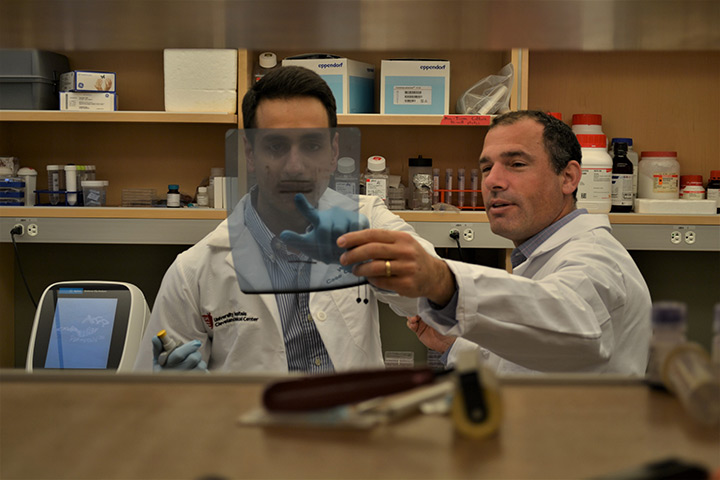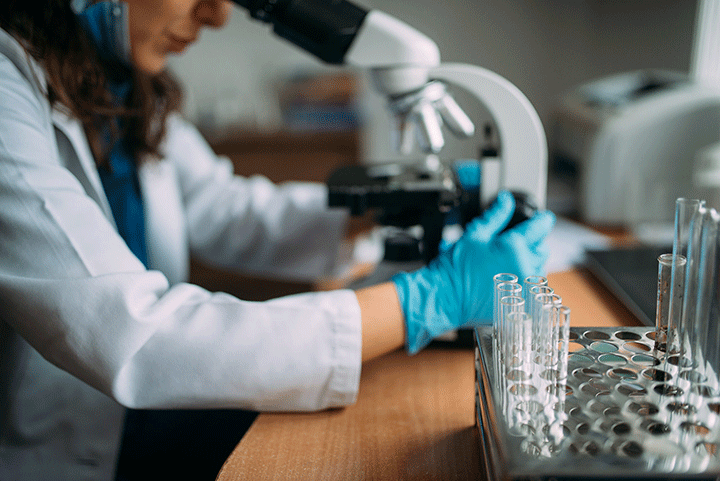Higher Glucose Levels May Improve Chemotherapy Effectiveness

All cells, including cancer cells, have a voracious appetite for glucose.
Glucose and other sugars are the food, essentially a kind of high voltage power source, for myriad cell activities in practically all living things. Now, in a new study published in Nature Communications, researchers from University Hospitals Seidman Cancer Center and the Case Comprehensive Cancer Center (both in Cleveland, Ohio) report that a hyperglycemic state, one in which blood glucose levels are raised, also made pancreatic cancer more sensitive to chemotherapy in a mouse model. Results were replicated in cell culture and a group of patients with metastatic disease.
Research from 2017, conducted by the same scientists, showed low glucose levels in the tumor microenvironment of pancreatic cancer engendered chemotherapy resistance. But high glucose levels may confer chemosensitivity, explains senior author and surgeon–scientist Jordan Winter, M.D., Director of Surgical Services at UH Seidman Cancer Center, the John and Peggy Garson Family Endowed Chair in Pancreatic Cancer Research and Jerome A. and Joy Weinberger Family Master Clinician in Surgical Oncology.
“In pancreas cancer the tumor microenvironment is kind of like a food desert,” Winter says. “What it does is prime the cancer cells to become more resistant to therapy.” A good analogy: Elite runners who train under disciplined conditions are more fit, more powerful, and more adaptive in comparison to those who train casually and who eat and drink with abandon.
“It’s a seemingly simple concept that no one pursued,” Winter says. “We wondered if we made the conditions more favorable would those survival mechanisms tamp down.”
Examining the Effect of Glucose Levels
For the current study, the researchers started by validating a prior study of patients with localized pancreatic cancer. They then examined the impact of glycemic status on another group of patients treated for metastatic pancreatic cancer.
About 33 percent of the patients had elevated glucose levels (at least one glucose reading above 200 mg/dL). There were no appreciated demographic differences between normal (99 mg/dL or lower) and high glucose patients. A greater proportion of patients in the high glucose group had a documented diagnosis of diabetes.
The median overall survival among all patients who completed at least two cycles of chemotherapy was approximately 9.8 months in all the patients, on par with historical clinical trial data. Further analysis showed, however, that patients in the high glucose level group had a nearly 40 percent lower risk of dying, despite a higher level of CA 19-9, which is a measure of disease burden, as compared to patients in the normal glucose group. There were no associated survival differences observed based on glucose levels in an independent cohort of metastatic patients who did not receive treatment. That suggests the interaction with glycemic status may be present only for patients who receive chemotherapy.
The researchers followed up on these findings with a series of well-controlled studies in various mouse pancreatic cancer models of hyperglycemia. First, they induced hyperglycemia pharmacologically with a drug called streptozotocin. In another group of experiments, they induced hyperglycemia through diet, allowing mice to drink highly sweetened water at will.
In experiments with grafted pancreas tumors on hyperglycemic mice, the researchers found greater sensitivity to single-agent chemotherapy in the two independent models of mice with hyperglycemia. As observed previously with patients in the absence of chemotherapy, no significant differences in growth rates were observed with hyperglycemia compared to mice with normal blood sugar levels in the absence of chemotherapy exposure. The researchers also tested a multiple agent chemotherapy to replicate what a patient might receive today and validated that hyperglycemia alters the metabolic state within tumors to sensitize it to treatment.
“We show that the effectiveness of diverse chemotherapies was markedly improved under high glucose conditions, as compared to low glucose conditions. In some instances, the mice appeared to be cured of their cancer, while mice receiving the same chemotherapy under normal glycemic conditions had relatively little benefit,” Winter explains.
Research Focus
Winter is a member of the Developmental Therapeutics Program at Case Comprehensive Cancer Center and Professor of Surgery at Case Western Reserve University School of Medicine. His research focuses on gaining a better understanding of just how pancreatic cancer cells adapt to their harsh, nutrient-deprived microenvironment and other forms of cancer-associated stress.
“I’m very excited about this study,” Winter says. “The data is good. We did it in two separate cohorts. And we see a signal.”
One of the biggest boons may be the cost effectiveness of this approach. “Drug development is very expensive and time consuming and it’s important that we may be able to make a difference with tools that are already available,” he adds. “We know pancreatic cancer is very resistant to chemotherapy, but it’s the best available systemic treatment. We need to think differently and look at how we may be able to improve chemotherapy for our patients.
“We can’t keep doing the same things. Pancreatic cancer is a very tough disease, so we need to ask a lot of questions, look at things differently, and hopefully do much better by our patients.” The next step is to implement a clinical trial. Researchers are in the early phase of designing a trial that would involve treating patients safely with intentionally elevated blood sugar to determine if this strategy can improve patient outcomes.






